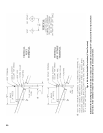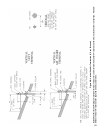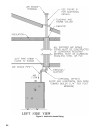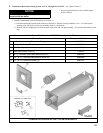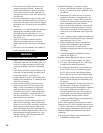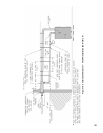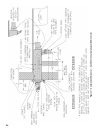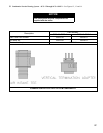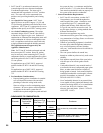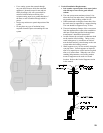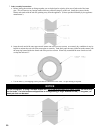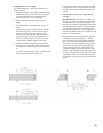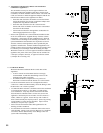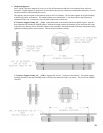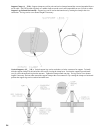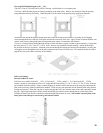
28
1. Saf-T Vent SC is an advanced concentric vent
system designed for zero clearance installation
in residential applications. The inner wall is
constructed from superferritic AL29-4C
®
stainless
steel. The outer wall is also constructed from
stainless steel, providing durability and a lasting
nish.
2. As a Special Gas Vent system: Saf-T Vent is
approved for use on ANSI Category I, II, III, and
IV Gas-Burning Appliances and certain Direct Vent
Appliances. Saf-T Vent SC is appropriate for use on
appliances that specify an AL29-4C venting system.
3.
As a Sealed Combustion system: The unique
concentric design of Saf-T Vent SC also allows it
to function as a pipe-in-a-pipe vent. Products of
combustion are exhausted out through the inner wall
while combustion air is drawn in through the outer
wall. An appliance can be direct-vented with only
a single penetration through the building structure.
This application must be approved by the
Appliance Manufacturer.
Note: Saf-T Vent SC includes an integral seal and
does not require RTV sealant. However, sealant
may be necessary when connecting Saf-T Vent SC
components directly to certain appliance ue collars
and to the gasket-less Saf-T Vent GC and Saf-T Vent
CI vent systems.
For applications up to 550°F/288°C, approved
sealants include GE RTV 106 and Dow Corning
736.
For applications up to 300°F/149°C, approved
sealants include GE RTV 106 and Dow Corning
732.
4. Pre-Installation Considerations:
• Proper planning prior to installation is essential
as to avoid possible contact with concealed
plumbing or electrical wiring inside walls,
oors or ceilings as well as maintaining proper
clearances. Be sure to plan a sufcient number
of supports for the entire system that will
maintain the required straight-line pitch and hold
the system in place. A continuous straight-line
pitch of at least ¼” (2°) to the foot on horizontal
runs must be maintained in order to properly rid
the system of the corrosive condensate.
5. General Installation Requirements:
• Saf-T Vent SC vent sections, or other Saf-T
Vent products, must be used throughout the
entire length of the system. Alternatives such
as galvanized pipe, PVC, nonmetallic pipe,
prefabricated chimney, eld-fabricated vents
or Type B vent sections must not be used. Do
not mix pipes, ttings, or joining methods from
different manufacturers.
• More than one appliance may not be
interconnected to any part of the venting system.
• Any penetrations of ceilings, oors or walls must
be properly re-stopped.
• Whenever gas-burning equipment is installed in
the same space where halogenated substances
may exist (refrigerants, solvents, bleaches,
salts, etc.), clean outside air must be utilized for
combustion.
• The vent system shall not be routed into,
through or within any other actively used vent or
chimney.
• Seal weather exposed joints of the outer jacket
with foil tape or an exterior grade silicone
sealant.
• Combustible Material is any material made of
or surfaced with wood, compressed paper, plant
bers, or other materials that are capable of
being ignited or burned. Such material shall be
considered combustible even though it is ame-
proofed, re-retardant, or plastered. (Source:
NFPA54/ANSI Z223.1-1999.)
• Non-Combustible Material is any material that
is not capable of being ignited and burned, such
material consisting entirely of, or a combination
of, steel, iron, brick, tile, concrete, slate,
asbestos, glass and plaster. (Source: NFPA54/
ANSI Z223.1-1999.)
CLEARANCES TO COMBUSTIBLES:
Diameter
Clearance to
Combustible
Material
Maximum Flue
Gas Temp. (°F)
Orientation Enclosure
3” - 4”
0”
550
Vertical, No
Offsets
Fully enclosed by combustible material on all
sides330
Horizontal,
Vertical with
Offsets
1” 400
0” 400
Unenclosed, at least 1 side open, combustible
material on a maximum of 3 sides
1” 550
0” 550 Any Noncombustible material



